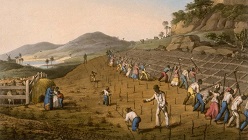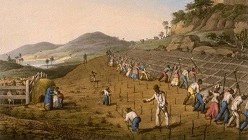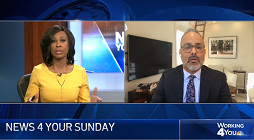NPR's Ailsa Chang talks with Daryle Williams, an associate history professor at the University of Maryland, about the Enslaved.org initiative aimed at documenting the lives of enslaved people.
Click here to listen.
Transcript:
AILSA CHANG, HOST: Twelve and a half million people were sold into slavery during the transatlantic slave trade, but little to nothing is known about the lives of the vast majority of those enslaved people. A new project seeks to change that. The initiative, called Enslaved.org, is documenting the lives, the names and experiences of both enslaved people and the perpetrators of the slave trade. Daryle Williams teaches history at the University of Maryland and is a co-principal investigator.
Welcome.
DARYLE WILLIAMS: Thank you so much, Ailsa.
CHANG: So, you know, the first enslaved people arrived in America 400 years ago. And in the centuries since, you know, we've seen families and researchers like yourself try to document this incredibly shameful past, and yet there is still so much we do not know about the lives of these individuals. Why do you think that is? Why do you think we don't know more?
WILLIAMS: Well, slavery itself was a system of violence and an attempt to strip individuals of their lives, of their names, of their families. And that has many ramifications in the documentary record that, you know, fractured those lives and stripped those names away. And we live with that today in the legacies of slavery and all the things associated with anti-Blackness that come to frame what we think is knowable or worthy of knowing. And so we tried in this project to address some of that and hopefully remedy some of it.
CHANG: Yeah. So it sounds like a lot of the research that has been done already has been done in this piecemeal fashion; it's focused on one particular region or era. Do you feel like your project is trying to connect the dots between different bodies of scholarship that have already existed but existed separately from each other?
WILLIAMS: Certainly. In terms of the - there's a tremendous amount of scholarly energy and effort in the work that's being done by various kinds of scholars to try to uncover the lives and the names of enslaved people. Connecting that scholarship together, that is something we've - we're learning it's possible to connect these various kinds of projects.
In connecting those projects, we're also understanding that it's going to be possible - we've already made some advances here of actually connecting the people who are in the various datasets - a sale that might be in one dataset connecting that same person to a baptismal record in another dataset or a flight ad (ph) in another dataset. So to connect those - that is possible. We've learned that now to be possible.
CHANG: Well, ultimately, how do you hope people like me can use the information in this database?
WILLIAMS: There's so many different ways. You know, we do have people who want to find a direct connection, and they're looking for names of family members or ancestors, maybe someone they have - directly know or they suspect, whether it's last names or first names - and so that discovery process of finding one's own past.
But sometimes it's not about finding one's own past, but it's about finding out about a place or time period to begin to understand more broadly what the lives of the enslaved would look like in various spaces and times, what their voices sounded like and registered in various kinds of documents, the violence and the pressures that they faced and the choices. And so to be able to understand, potentially to empathize, certainly to comprehend the fullness of the lives of the enslaved is something which I do think many different people, including yourself, might be interested in.
CHANG: I mean, what do you think many people still misunderstand about the lives of enslaved people?
WILLIAMS: That - the fullness. I think that that is something that's very - it's a deep, dark legacy of enslavement itself - to strip the fullness. And so that is very difficult to understand - family life, to understand the dreams and hopes, the personalities which come across in some of the documents and court testimonies, for instance. I just find these personalities in these stories. There's peculiarities. And I think that that's a very troubling dimension to the broader violence of enslavement - is to strip this humanity from these individuals and their families and their lives and our knowledge about that.
CHANG: Daryle Williams is a co-principal investigator with Enslaved.org.
Thank you so much for being with us today.
WILLIAMS: Thank you.









